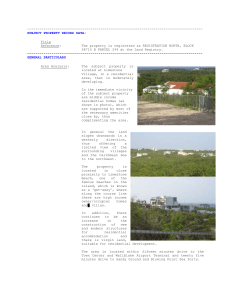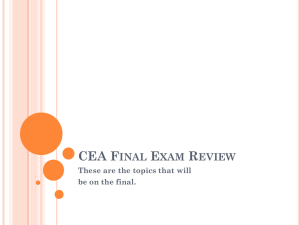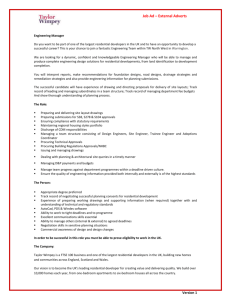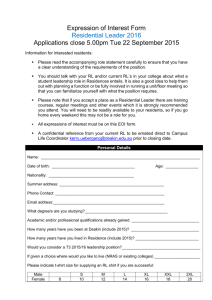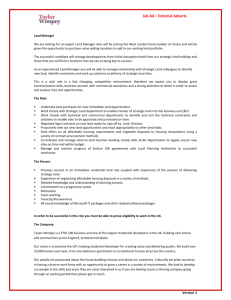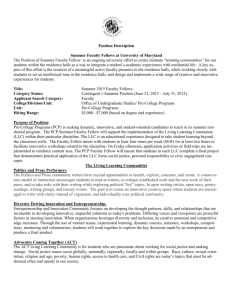Residential Life Middle States Review Goal 1
advertisement
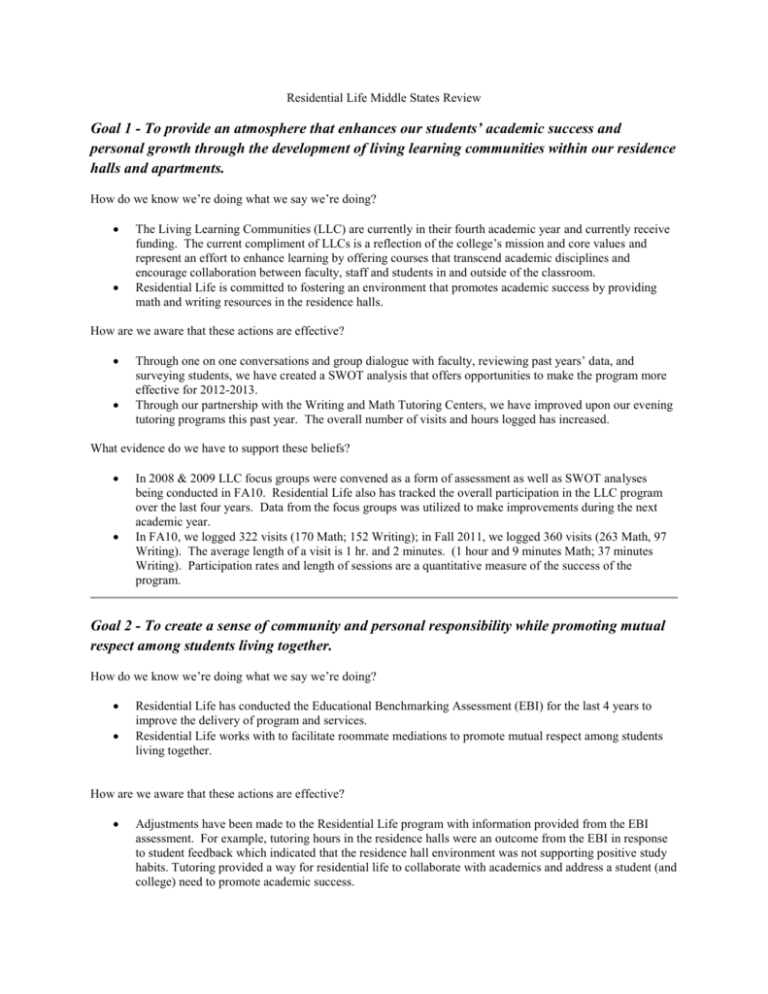
Residential Life Middle States Review Goal 1 - To provide an atmosphere that enhances our students’ academic success and personal growth through the development of living learning communities within our residence halls and apartments. How do we know we’re doing what we say we’re doing? The Living Learning Communities (LLC) are currently in their fourth academic year and currently receive funding. The current compliment of LLCs is a reflection of the college’s mission and core values and represent an effort to enhance learning by offering courses that transcend academic disciplines and encourage collaboration between faculty, staff and students in and outside of the classroom. Residential Life is committed to fostering an environment that promotes academic success by providing math and writing resources in the residence halls. How are we aware that these actions are effective? Through one on one conversations and group dialogue with faculty, reviewing past years’ data, and surveying students, we have created a SWOT analysis that offers opportunities to make the program more effective for 2012-2013. Through our partnership with the Writing and Math Tutoring Centers, we have improved upon our evening tutoring programs this past year. The overall number of visits and hours logged has increased. What evidence do we have to support these beliefs? In 2008 & 2009 LLC focus groups were convened as a form of assessment as well as SWOT analyses being conducted in FA10. Residential Life also has tracked the overall participation in the LLC program over the last four years. Data from the focus groups was utilized to make improvements during the next academic year. In FA10, we logged 322 visits (170 Math; 152 Writing); in Fall 2011, we logged 360 visits (263 Math, 97 Writing). The average length of a visit is 1 hr. and 2 minutes. (1 hour and 9 minutes Math; 37 minutes Writing). Participation rates and length of sessions are a quantitative measure of the success of the program. Goal 2 - To create a sense of community and personal responsibility while promoting mutual respect among students living together. How do we know we’re doing what we say we’re doing? Residential Life has conducted the Educational Benchmarking Assessment (EBI) for the last 4 years to improve the delivery of program and services. Residential Life works with to facilitate roommate mediations to promote mutual respect among students living together. How are we aware that these actions are effective? Adjustments have been made to the Residential Life program with information provided from the EBI assessment. For example, tutoring hours in the residence halls were an outcome from the EBI in response to student feedback which indicated that the residence hall environment was not supporting positive study habits. Tutoring provided a way for residential life to collaborate with academics and address a student (and college) need to promote academic success. Beginning FA10, Residential Life began to document roommate conflicts through Maxient (case management software) to assist in tracking the progress of mediation and student/staff interaction. 20092010, 27 student reports of concern were generated. 2010-2011, 82 student reports of concern were generated after technology was implemented more effectively. 2011-2012, 357 reports of concern were generated by residential life as of February 16, 2012. What evidence do we have to support these beliefs? For the past two years, roommate conflicts have been a part of case management and have allowed the Associate Director to work closely with staff to manage the mediation process. All notes on student/staff interactions are inputted into Maxient, the case is updated as progress is made, and the case is closed upon completion (conflict is resolved or a room change occurs). A Behavioral Intervention Team (BIT) was created at Stockton to manage and discuss ongoing concerns which conflicted with creating a strong community and/or promoting mutual respect. Goal 3 - To value diversity in all dimensions. To strive for inclusivity and give residents a sense of belonging. How do we know we’re doing what we say we’re doing? Residential Life created gender neutral housing as a preference for students. Residential Life promotes the Diversity LLC as one of its Living Learning Communities. How are we aware that these actions are effective? Residential Life conducted a survey of the pilot group of students to gauge satisfaction in gender neutral housing. The department collaborated with the PRIDE alliance to initiate this program. In fall 2011, 20 students participated in this pilot program. The Diversity LLC continues to be one of the most poorly attended LLCs 2009-2010, 6 members; 20102011, 11 members; 2011-2012, 3 members. What evidence do we have to support these beliefs? 88% of the students who responded to the survey said they, “Enjoyed Gender Inclusive Housing” more or much more than, “Gender Specific Housing.” 88% of the students who participated in the survey that they thought Gender Inclusive Housing should remain an option for campus housing. Diversity LLC attendance: 2009-2010, 6 members; 2010-2011, 11 members; 2011-2012, 3 members. Goal 4 - To act in accordance with our core belief that co-curricular programs and activities are essential to the overall development of students. How do we know we’re doing what we say we’re doing? Resident Assistants must produce a program once a month in the residence halls/apts. under a Complex Director’s supervision. Residential Life supports college-wide programs such as the Day of Service and the Day of Leadership conference. How are we aware that these actions are effective? The Associate Director of Residential Education requires monthly programming reports from Complex Directors on programs. The reports measure attendance, feedback and student learning outcomes. The Day of Service and Day of Leadership both assess the program for improvements in the future; assessment instruments are connected to specific learning outcomes. What evidence do we have to support these beliefs? In Fall 2009, Residential Life supported over 70 resident assistant programs. As a result of the Spring 2011 Day of Leadership, students learned the following: How to “be a better public speaker”, and how to “effectively deliver a presentation.”



